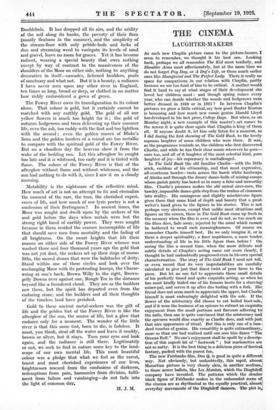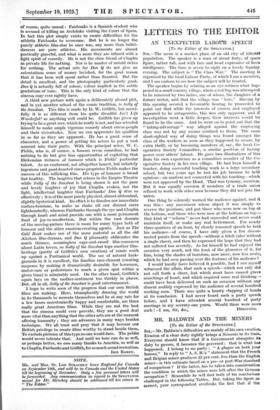THE CINEMA
LAUGHTER-MAKERS
As each new Chaplin picture came to the picture-houses, I seem to remember, we thought it his best one. Looking back, perhaps we all remember The Kid most tenderly, and Shoulder Arms most affectionately, but at the same time we do not forget Pay Day, or A Dog's Life, or those much earlier ones like Shanghaied and The Perfect Lady. There is really no space for comparisons in our relation with Chaplin, partly because we are too fond of him to be critical. A mother would find it hard to say at what stages of their development she loved her children most : and though spring comes every year, who can decide whether the woods and hedgerows were better dressed in 1910 or in 1925 ? In between Chaplin's pictures we grow a little critical, say how good Buster Keaton is becoming and how much new comic genius Harold Lloyd has developed in his last piece, College Days. But when, as on. Monday night, a new example of this master's art comes to the screen it is quite clear again that Chaplin is king of them all. If anyone doubt it, let him only listen for a moment, as.
I did during the first showing of The Gold Rush, to the lovely, soprano laughter of some children who were there. It was,;
as the programme reminds us, the children who first discovered; Charlie, and while he has their clear music wherever he goes—, ours too, and all of it laughter of the most celestial kind, pure laughter of joy—his supremacy is unchallenged.
In The Gold Rush the old familiar Charlie—with the little, stick, emblem of his citizenship, and that most expressive,'
all-courteous bowler—trots across the harsh white landscape, of Alaska and through the dreary dance-halls of mining-camps' whose garish gaiety has bored us in many a false and unworthy: film. Charlie's presence makes the old unreal cave-men, the tawdry, impossible dance-girls step from the realms of cinamese into reality. His courageous and slightly mischievous figure; gives them that same kind of depth and beauty that a great( writer's hand gives to the figures in his stories. This is not perhaps very obvious, except that unlike most situations and figures on the screen, these in The Gold Rush come up fresh in the memory when the film is over, and do not, as too much onj the films does, fade away, rejected by the mind which cannot be bothered to recall such meaninglessness. Of course we, remember Charlie himself best. Do we only imagine it, or is: there a deeper spirituality, a finer impishness, a more tender understanding of life in his little figure than before ? On seeing the film a second time, when the more delicate and subtle details of Chaplin's acting came out more clearly, thought he had undoubtedly progressed even in his own special; characterization. The story of The Gold Rush I need not tell, or even record that its very improbabilities are carefully calculated to give just that finest twist of pure farce to the piece. But let no one fail to appreciate those small details, of his perfectly timed and quite exquisite acting, as when he has most kindly boiled one of his famous boots for a starving miner-pal, and serves it up after due testing with a fork. His friend does not seem much to appreciate the upper, but Charlie himself is most endearingly delighted with the sole. If the` flower of the aristocracy did choose to eat boiled boot-sole, and if it were the business of an epicure to extract an exquisite enjoyment from the small portions and flavours adhering to the nails, then one is quite convinced that the aristocracy and the epicures would dine exactly as Charlie does, and with just` that nice appearance of ritual. But this is only one of a hun-j dred touches of genius. His versatility is quite extraordinary,1 more so than one had realized until one sees him dance " The Oceans Roll." No one's enjoyment shall be spoilt by a descrip-, tion of this superb bit of " footwork " ; but marionettes are not so natty. It is the best thing in a delicious piece of fareicall fantasy, packed with the purest fun.
The new Fairbanks film, Don Q, is good in quite a different way. Not obviously, but undoubtedly, this rapid, almost Mozartian picture is very closely akin, in another medium, to those newer ballets, like Les Matelots, which the Diaghileff company have invented. The patterns which the slender, black figure of Fairbanks makes in the unbounded scale of the cinema are as rhythmical as the equally practical, almost everyday movements of the Diaghileff dancers. The plot is of course, quite unreal : Fairbanks is a Spanish student who is accused of killing an Archduke visiting the Court of Spain. In fact this plot simply exists to create difficulties for the athletic Fairbanks to overcome. But he is no longer the purely athletic film-star he once was, any more than ballet- dancers are pure athletes. His movements are almost poetically graceful, and what is more they are infused with a light spirit of comedy. He is not the close friend of Chaplin in private life for nothing. Nor is he master of untold riches for nothing. The actual sets for Don Q do not give an ostentatious sense of money lavished, for the good reason that it has been well spent rather than flaunted. But the detail is excellent, and the photography particularly good. Don Q is actually full of colour, colour implicit in the subtle gradations of tone. This is the only kind of colour that the cinema may ever rightly have.
A third new picture with again a deliberately absurd pla, and in yet another school of the comic tradition, is Sally of 'the Sawdust. This film is made. by D. W. Griffith, but merci- fully it is as different from his quite dreadful Isn't Life Wonderful? as anything well could be. Griffith has given up trying to be a great seer, which he really is not, and has schooled ;himself to make ample vigorous comedy about circus-people and their vicissitudes. Now we can appreciate his qualities in so far as they are apparent. He has a great sense of ;character, and a power of getting his actors to put a vast amount into their parts. With the principal actor, W. C. 'Yields, who is, of course, a famous revue comedian, he had nothing to do but give him opportunities of exploiting that Dickensian richness of humour which is Fields' particular talent. As an exuberant, not altogether honest, but infinitely ingenious and good-hearted circus-proprietor Fields makes the {success of this rollicking film. His type of humour is broad but healthy. The laughter that echoes in the Empire Theatre while Sally of the Sawdust is being shown is not the pure and lovely laughter of joy that Chaplin evokes, not the ;light, intellectual laughter that Fairbanks' Don Q stirs so effectively ; it is of the more purely physical, almost abdominal, slightly hysterical kind. Its effect is to dissolve our immediate surface-tensions, to make us shake off our diurnal cares lightheartedly, whereas Fairbanks through the eye and Chaplin through heart and mind provide one with a more permanent fund of joy-in-recollection. But within the vast domain of :the moving-picture there is room for many types both of humour and the other emotion-creating agents. Just as The Gold Rush makes use of the same material as all the old %Alaskan film-dramas, and Dan Q pleasantly obliterates the much thinner, meaningless cape-and-sword film-romances ;about Latin lovers, so Sally of the Sawdust tops another film- :heritage (partly of Griffith's own creation) of comic waifs {up against a Puritanical world. The use of natural back- grounds in it is excellent, the familiar race-element (creating !suspense by making it dramatically desirable for horsemen, motor-cars or pedestrians to reach a given spot within a given time) is admirably used. On the other hand, Griffith's again lays on the mother-sentiment too thickly in places. {But, all in all, Sally of the Sawdust is good entertainment.
I hope to write soon of the progress that our own British films are making. Here, triumphantly drawing the world in its thousands to recreate themselves and be at any rate for a few hours unrestrainedly happy and comfortable, are three
{really great American films. While they are not the best that the cinema could ever provide, they are a good deal more vital than anything that the other arts are at the moment offering humanity ; they are advances in many ways besides technique. We all trust and pray that it may become our British privilege to create films worthy to stand beside them. To exclude pictures of this type no one would dare. The public would never tolerate that. And until we here can do as well, or perhaps better, we owe many thanks to America, as well as to Chaplin, Fairbanks and Griffith, for so much sound recreation.
IRIS BARRY.











































 Previous page
Previous page